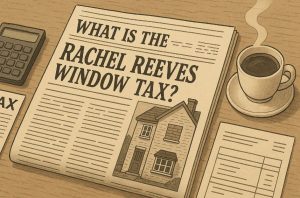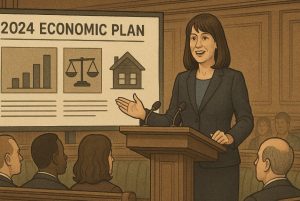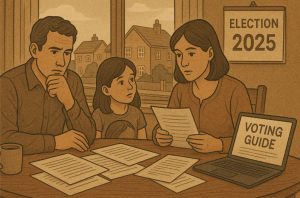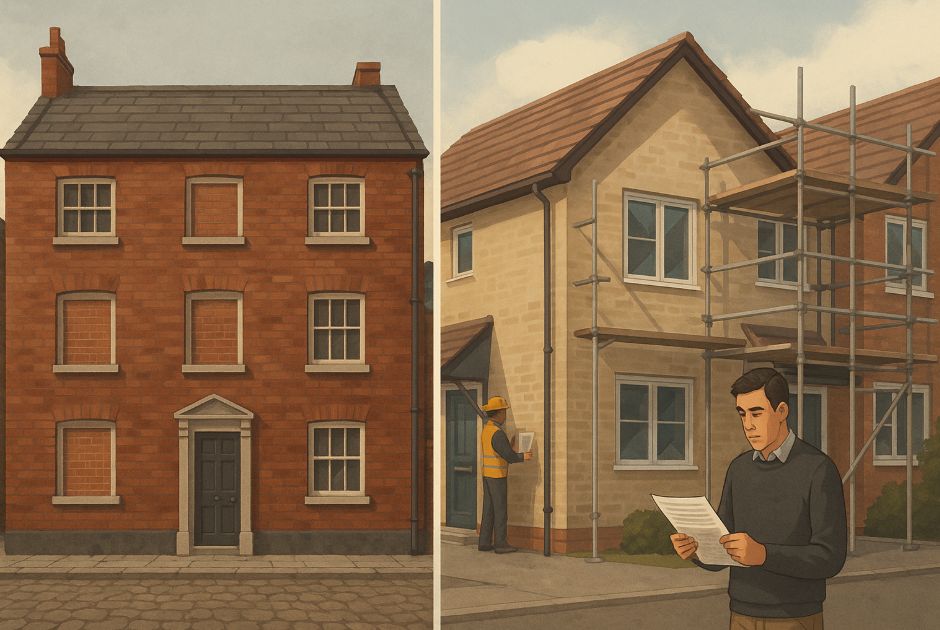In the dynamic landscape of British politics, few phrases have stirred as much confusion and concern as the term “Rachel Reeves window tax”.
First mentioned in early 2024, this phrase quickly went viral, fuelling fears among homeowners that the Labour Party was preparing to impose a new property tax one that, according to critics, could charge people for something as simple as installing extra windows or upgrading their homes.
While the headline-grabbing term drew widespread attention, the reality of what Rachel Reeves—Labour’s Shadow Chancellor—actually proposed is far more nuanced.
This blog dives into the origins of the so-called window tax, explores the historical context, dissects Labour’s actual policy proposals, and clarifies the public misunderstanding. Whether you’re a homeowner, investor, or voter, here’s what you really need to know.
What Is the So-Called “Rachel Reeves Window Tax”?

The term “Rachel Reeves window tax” did not originate from any official policy statement, press release, or manifesto document from the Labour Party. Instead, it emerged in political rhetoric and tabloid headlines, largely as a reaction to Labour’s proposed economic reforms under Rachel Reeves in her 2024 Shadow Budget.
Opponents of the Labour Party claimed that Reeves’ tax proposals particularly those around revising council tax and evaluating property wealth would indirectly penalise those who made improvements to their homes. In response, some commentators labelled these reforms a “modern-day window tax,” alluding to the infamous levy from centuries ago.
However, Reeves and her party were quick to dismiss the label, calling it misleading and sensationalist. They clarified that no such tax targeting windows or property features had been proposed. The phrase was instead part of a political campaign strategy, designed to frame Labour’s broader economic fairness agenda as hostile toward the average homeowner.
What’s the Real History Behind the Original UK Window Tax?
The term “window tax” originates from a real British tax introduced in 1696 by King William III. Designed to tax wealth without targeting income directly, the tax charged homeowners based on the number of windows in their property. This led many to brick up windows to avoid paying, resulting in dark and poorly ventilated homes.
Widespread criticism followed, and the tax was eventually abolished in 1851. In 2024, the phrase returned as a metaphor, used by critics of Labour’s tax reforms to suggest they might discourage home improvements drawing a symbolic, not literal, link to the historic policy.
Where Did the Idea of a Modern Window Tax Come From?
Historical Origins
The original window tax was introduced in 1696 as a way to tax wealth without directly taxing income. The idea was simple: the more windows a house had, the wealthier the owner was presumed to be.
Social Consequences
Homeowners responded by bricking up windows to avoid tax. The policy led to dark, poorly ventilated homes and was criticised for its negative public health impact. It was finally abolished in 1851.
The 2024 Comparison
In 2024, the window tax label returned as a metaphor. Critics used it to claim that Labour’s tax review might discourage home improvements an echo of the historic outcome, despite the lack of a real connection.
What Does Rachel Reeves Actually Propose in Her 2024 Economic Plan?

Reforming Wealth Taxation
Rachel Reeves proposed reviewing the non-dom status and closing tax loopholes for wealthy UK residents with overseas income. Her aim was to create a tax system that reflects the modern economic landscape.
Cracking Down on Avoidance
There’s a significant focus on targeting aggressive tax avoidance by multinational corporations and high net worth individuals who exploit outdated tax rules.
Council Tax Reform
Reeves signalled a willingness to review the council tax system, which hasn’t been revised since the early 1990s. Critics argue it’s outdated and unfairly burdens lower-income households.
Supporting Green Investments
Labour has also committed to investing in green infrastructure, including funding for home insulation and retrofitting indicating support for sustainable home improvements, not penalisation.
How Could These Tax Plans Affect British Homeowners?
Impact on Council Tax Bands
If council tax is revalued, homeowners with heavily improved or extended homes might find themselves moved into a higher band, potentially facing larger bills.
Speculation Around Property Wealth Taxes
While no tax on property upgrades is currently proposed, discussions about taxing unearned wealth, including from property, continue to circulate within policy circles.
No Direct Renovation Tax
Despite the alarm raised by opponents, there is no formal tax being introduced on windows, extensions, or home upgrades. The policy conversation is focused on equity, not deterrence.
How Has the Public and Political World Reacted to the Window Tax Debate?
Conservative Party Criticism
Conservative MPs and spokespeople quickly latched onto the “window tax” phrase, using it to argue that Labour would punish ambition and homeownership.
Media Interpretation
Coverage varied across publications. Some like The Telegraph reported the term uncritically, while outlets such as The Guardian debunked the myth and clarified the proposals.
Mixed Public Opinion
Online forums and social platforms saw heated debate. While some homeowners expressed fear, others called for fact-based discourse and highlighted the benefits of tax fairness.
Is This Policy Being Misrepresented in the Media?

Political Language at Play
The “window tax” label is a powerful rhetorical device that conjures strong emotional associations, even though it’s a complete mischaracterisation of Labour’s economic plan.
Lack of Supporting Evidence
Independent fact-checkers like Full Fact UK and analysts at the Institute for Fiscal Studies found no supporting evidence that such a tax exists in Reeves’ proposals.
A Warning for Voters
This episode demonstrates how headlines and political spin can create lasting public impressions, even when they’re based on fiction rather than fact.
What Are the Long-Term Implications for the UK Housing Market?
Possible Caution from Investors
Buy-to-let landlords and those with second homes may become more conservative in their spending if tax relief or treatment on property assets changes under a future Labour government.
Enhanced Equity in Taxation
If council tax is modernised, homes with greater value or extensive development might pay slightly more, balancing the burden more fairly across income brackets.
Support for Green Housing Projects
Far from discouraging renovation, Labour’s strategy supports sustainable upgrades that help the UK meet climate targets indicating a forward-thinking housing policy, not a punitive one.
Could This Alleged Tax Discourage Home Ownership or Renovation?
Perception Can Influence Behaviour
Even though no such tax exists, the fear of additional taxes may deter some homeowners from carrying out renovations, particularly expensive extensions or improvements.
Green Upgrades Are Encouraged
Labour has made clear its support for eco-friendly retrofits, meaning homeowners might find incentives rather than penalties for improving their homes.
No Legislative Basis
There is currently no policy or proposed legislation that imposes a direct cost on adding windows or improving a property. The rumours have no grounding in fact.
What Should Homeowners and Voters Be Paying Attention to in 2025?

Follow Official Party Manifestos
With the general election looming, the best way to stay informed is to read the manifestos from Labour, Conservatives, and other parties.
Use Trusted Fact-Checking Sites
Organisations like Full Fact and the Institute for Fiscal Studies provide reliable, non-partisan insights into what’s being proposed and what’s being exaggerated.
Understand the Real Tax Landscape
Rather than reacting to dramatic headlines, voters should evaluate how each party’s policies would impact their financial reality, not theoretical or misrepresented scenarios.
Historic Window Tax vs. Modern Policy Debates
| Aspect | Historic Window Tax | Rachel Reeves Proposal (2024) |
| Time Period | 1696–1851 | Introduced in Shadow Budget 2024 |
| Tax Basis | Number of windows | Unclear, property/wealth focus |
| Purpose | Raise funds for wars | Economic reform and balancing budget |
| Public Response | Unpopular, avoided by bricking up windows | Criticism and misinformation |
| Actual Implementation | Yes | No formal policy called ‘window tax’ |
Conclusion
Despite the noise and speculation, there is no such thing as a “Rachel Reeves window tax”. The phrase is a political invention designed to provoke fear, not a reflection of Labour’s actual fiscal policies.
Reeves’ economic vision for 2025 and beyond is about closing loopholes, modernising outdated systems, and making the tax system more equitable especially for the majority of working families in the UK. For those who own property or are considering renovations, there’s no evidence that such activities will be penalised under a future Labour government.
As election debates heat up, this controversy serves as a powerful reminder to read beyond the headlines and focus on verified facts.
FAQs About Rachel Reeves window tax
Was a window tax ever officially proposed by Rachel Reeves?
No. Rachel Reeves has not proposed a tax on windows. The term is politically motivated and not reflected in any official Labour documentation.
What is the actual focus of Rachel Reeves’ economic plan?
Reeves is focused on tax fairness, modernising council tax, closing loopholes, and investing in public infrastructure and green housing.
How did the historic window tax work in the UK?
The window tax, active between 1696 and 1851, taxed homes based on the number of windows, leading many to brick them up to avoid higher charges.
Will my home renovations be taxed more under Labour?
Currently, there is no policy proposing additional tax for home renovations or property upgrades. These fears are unfounded.
Why are people comparing this to the historic window tax?
Because it creates a powerful emotional reaction. The comparison has been used by critics to stir public concern, though it’s not factually accurate.
Could this affect buy-to-let landlords or second home owners?
Yes, if Labour changes how property investments are taxed. These changes would aim to ensure fairness, not discourage home ownership.
Where can I verify Labour’s tax proposals?
Check Labour’s official website, the Shadow Budget 2024, and independent sources like Full Fact and the Institute for Fiscal Studies.









Leave feedback about this